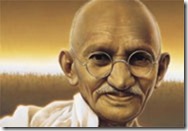The October 2nd birthday of the ‘Father of the Indian Nation’, Mahatma Gandhi, is a national holiday and celebrated with great vigor and prayers. Since schools are closed on Gandhiji’s birthday, the students at Lakshmi Devi Academy (LDA) KHEL’s school for underserved children in Dehradun, India, observe and celebrate the day before; the teachers speak to the students about Gandhiji’s life, his dedication to non-violence and what it means in practical terms to lead a nonviolent life. At KHEL, we practice the spirit of this every day; for example, in most Indian schools corporal punishment is still the norm for disciplining students. At LDA, our faculty and staff treat the kids with respect, and violence of any kind is unheard of. In yoga philosophy and the Himalayan Tradition one of the first lessons in Yamas and Niyamas include the practice of non-violence in thought, word and deed…indeed difficult to practice unless inculcated from childhood and later by deliberate action in adulthood. It took Gandhiji several years, lots of persistence and discipline to make this his life’s philosophy, but in the end his perseverance and that of his followers won and India gained independence from the British in 1947.
I watched the interview of Jon Stewart, an American comedian and political commentator, with the now famous 16 year old Swat Valley teenager, Malala, and was amazed at her equanimity, wit, precise language and most of all her lilting laughter. What was most incredible was her statement about what she would do if one of her attackers came to harm her. Among other things, she said that she was only 14 years old when she was threatened and warned by the terrorists to stay away from school and to stop encouraging girls to attend school. She said that she thought if they ever approached her, she would slap them with her sandals – an action used in many part of the world to indicate disgust with a person; although the physical action isn’t a deterrent, shoes are considered unclean and the insult of being hit by a shoe is taken seriously. Then came her astounding statement that, having thought about it, she decided that that action would be no better than the violence in which the terrorists themselves were involved. That is one of the most remarkable statements on the practice of non-violence.
Nav Ratra celebrations are observed after the period of Ancestors’ Remembrances. This is a Hindu festival and there is a government mandated holiday for the observances on the final day of Vijaya Dashami, which is also the day the Mother of Knowledge is acknowledged and Her blessings are sought.
Eid is also celebrated this month depending on the lunar cycle, and is the commemoration of the Muslim saint, Ibrahim. This is a Muslim festival and, like Vijaya Dashami, is a government mandated holiday.
At LDA, we respect the rights of all individuals to practice the religion of their choice. By celebrating holidays of various religions together, our children gain an understanding of the beliefs and practices of their friends. In the long term, we are helping create adults who respect each other, which is a vital component for peace and nonviolence.
photo courtesy of Gandhian Institutes Bombay Sarvodaya Mandal & Gandhi Research Foundation
